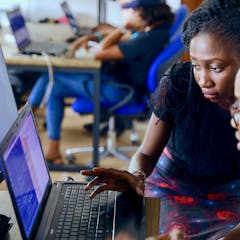
Articles sur Fourth industrial revolution
Affichage de 21 à 40 de 52 articles

Even a cursory glance at earlier industrial revolutions will show that they have not been associated with the interests of the working or underclasses.

The world of the fourth industrial revolution looks set to be one dominated by forms of knowledge and industries – like science and technology – that have long been dominated by men.

South Africa’s universities are detached from society because of a waning public and civic sector that once fueled the anti-apartheid struggle. Here’s what can be done.

The governments needs to adjust its agenda to take on board concerns voiced by citizens about the impact of technological changes.

Training providers and employers aren’t adapting fast enough to meet the skill needs thrown up by the fourth industrial revolution.

How Indonesia can improve its policy on the future on work

As artificial intelligence increasingly intersects with our work and personal lives, we will need to adapt to survive in this new reality.

Choosing a career that is unlikely to become automated or done by artificial intelligence, and learning soft skills will give graduates better career prospects in the long run.

Making sport accessible to ordinary people can be achieved if communities take control of their organisations.

There is a plethora of highly troubling issues facing the global economy that are caused, in part, by globalisation.

Learning to code is often presented as a solution to job market problems of the 21st century, but are students really learning the competencies they will need?

South Africa’s copyright law must not continue ignoring the principles of fair use.

A guide to the battle for the future of farming.

More innovative teaching and learning is needed to disrupt the current techno talk about the fourth industrial revolution.

We can’t simply try to work out what’s going to happen during the fourth industrial revolution.

The way humanities disciplines are taught at many universities does not lend itself to ready engagement with a changed and changing world.

Technology is already changing how we live our lives and go about our days. Are we ready with collaborative planning processes so we are not taken by surprise by more profound change?

Talk of the post-industrial society is mostly hype without evidence.

Developing country governments need to give attention to the risks associated with new technologies and develop context-specific responses.

Academics deliver their verdict on Philip Hammond.
